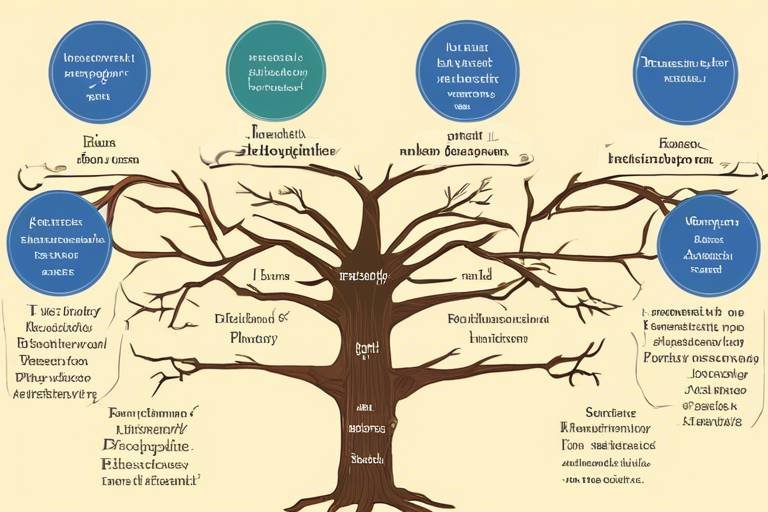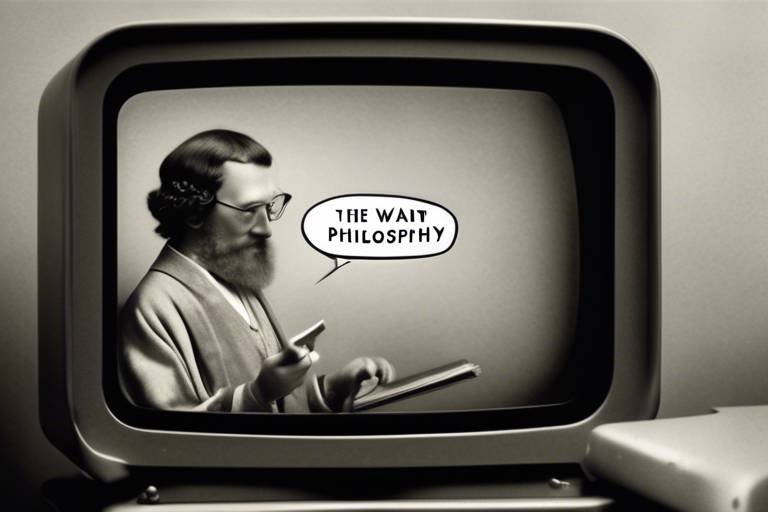What is the Concept of Perfectionism in Philosophy?
The concept of perfectionism in philosophy is a fascinating and complex idea that challenges us to think deeply about what it means to live a good life. At its core, perfectionism is about striving for the highest possible standards in our personal and moral development. It invites us to consider not just the minimum requirements for a fulfilling life but to aim for something greater—a life of excellence and virtue. But what does this really mean in practice? How do we reconcile our aspirations for perfection with the reality of human limitations?
Historically, perfectionism has roots in ancient philosophical thought, where thinkers like Aristotle laid the groundwork for understanding human flourishing, or eudaimonia. Aristotle believed that true happiness comes from living a life of virtue, where one continuously strives to improve oneself. This idea resonates with many today, as it emphasizes personal growth as a lifelong journey rather than a destination. However, the pursuit of perfection can also lead to stress and dissatisfaction when we set unrealistic standards for ourselves.
In modern philosophy, perfectionism has evolved, influenced by various thinkers who have added layers of complexity to the discussion. For instance, philosophers like John Stuart Mill and G.E. Moore have examined how perfectionism intersects with ethics and morality, suggesting that our pursuit of the good life is inherently tied to our understanding of what it means to be 'perfect.' This raises questions about the nature of perfection: Is it an attainable goal, or is it more about the journey of striving for it?
Moreover, perfectionism is not just a personal endeavor; it can also reflect societal values. In a world where success is often measured by external achievements, the pressure to conform to these standards can be overwhelming. This societal lens shapes our understanding of perfectionism, making it essential to question whether these ideals genuinely contribute to our well-being or if they simply set us up for failure.
As we delve deeper into the implications of perfectionism, we must consider its ethical dimensions. How does our pursuit of perfection affect our moral responsibilities to ourselves and others? Can the ideals we aspire to lead us to greater compassion and understanding, or do they create a rigid framework that stifles our humanity? These are critical questions that highlight the dual nature of perfectionism—it can be both a motivating force for good and a source of anxiety.
Ultimately, the concept of perfectionism in philosophy encourages us to reflect on our values and the standards we set for ourselves. It challenges us to find a balance between striving for excellence and embracing our imperfections. After all, isn't it our flaws that make us human? As we explore this philosophical terrain, we invite readers to engage with these ideas and consider how they apply to their own lives.

Historical Background of Perfectionism
The concept of perfectionism has deep historical roots that stretch back to the foundations of Western philosophy. Understanding this background is essential for grasping how the idea has evolved over centuries and how it continues to influence our modern perceptions of ethics and personal development. The origins of perfectionism can be traced back to ancient philosophers, particularly Aristotle, whose ideas about human flourishing and virtue laid the groundwork for later interpretations. Aristotle's notion of eudaimonia, often translated as "the good life," emphasizes the importance of achieving excellence through the cultivation of virtues.
During the Enlightenment, philosophers like Immanuel Kant further developed the concept of perfectionism, intertwining it with moral philosophy. Kant's emphasis on duty and moral law introduced a new dimension to perfectionism, suggesting that ethical behavior stems from a commitment to universal principles rather than merely personal aspirations. This shift marked a significant evolution in the understanding of perfectionism, as it began to encompass not just individual excellence but also a sense of moral responsibility towards others.
As we moved into the 19th and 20th centuries, thinkers such as John Stuart Mill and G.E. Moore contributed further layers to the discourse on perfectionism. Mill’s utilitarian approach invited a consideration of happiness and well-being as central to the perfectionist ideal, while Moore introduced the notion of intrinsic goods, suggesting that certain things are inherently valuable and contribute to a perfect life. These contributions illustrate how perfectionism has been a dynamic concept, shaped by various philosophical movements and cultural contexts.
To better understand the evolution of perfectionism, we can categorize its historical development into key phases:
| Period | Key Thinkers | Contributions |
|---|---|---|
| Ancient Philosophy | Aristotle | Introduced the concept of eudaimonia and the importance of virtue. |
| Enlightenment | Immanuel Kant | Linked perfectionism with moral duty and universal principles. |
| 19th Century | John Stuart Mill | Focused on happiness and well-being as central to perfectionism. |
| 20th Century | G.E. Moore | Introduced the idea of intrinsic goods contributing to a perfect life. |
This historical exploration reveals that perfectionism is not a static concept; rather, it has adapted and transformed through the contributions of various philosophers. Each thinker has added layers of complexity to the idea, influencing how we perceive perfectionism today. In our current context, perfectionism continues to resonate, shaping our understanding of what it means to live a fulfilling and ethical life. As we delve deeper into the implications of perfectionism in ethics and personal development, we must recognize the rich philosophical heritage that informs our contemporary discussions.

Key Philosophers and Their Contributions
When we dive into the rich tapestry of perfectionism in philosophy, we can't overlook the profound influence of key thinkers who have shaped our understanding of this concept. Among the most notable are John Stuart Mill and G.E. Moore, both of whom contributed significantly to the discourse surrounding perfectionism. Their ideas not only illuminate the complexities of this philosophical stance but also challenge us to think critically about what it means to lead a fulfilling life.
John Stuart Mill is often celebrated for his utilitarian approach, which emphasizes the greatest happiness principle. However, his views on perfectionism offer a nuanced perspective that intertwines individual well-being with societal progress. Mill argued that the pursuit of personal excellence and the cultivation of higher pleasures are essential for true happiness. He posited that individuals should strive for self-improvement and intellectual development, which aligns closely with perfectionist ideals. In Mill’s view, a society that fosters the flourishing of its members is one that prioritizes not just the quantity of happiness but its quality as well.
On the other hand, G.E. Moore introduced the concept of "ideal perfectionism," which emphasizes the intrinsic value of certain experiences and states of being. Moore’s work highlighted the importance of understanding what constitutes a good life, suggesting that perfectionism is not merely about achieving goals but also about appreciating the beauty and richness of life itself. He argued that moral and aesthetic values are intertwined, and that striving for perfection in both areas leads to a more profound understanding of human existence. This perspective encourages individuals to seek out experiences that contribute to their overall well-being, thus promoting a holistic approach to perfectionism.
To further illustrate the contributions of these philosophers, we can summarize their key ideas in the following table:
| Philosopher | Key Contributions |
|---|---|
| John Stuart Mill | Emphasized the importance of personal excellence and higher pleasures in the pursuit of happiness. |
| G.E. Moore | Introduced the concept of ideal perfectionism, focusing on the intrinsic value of experiences and moral aesthetics. |
These philosophers not only expanded our understanding of perfectionism but also emphasized its ethical dimensions. Their works challenge us to reflect on our own lives and the standards we set for ourselves. Are we merely chasing after unattainable ideals, or are we genuinely striving for a life that is rich in meaning and fulfillment? The questions they raise are as relevant today as they were in their time.
In conclusion, the contributions of Mill and Moore serve as a foundation for understanding perfectionism in a broader philosophical context. They encourage us to think about how our aspirations for excellence can coexist with our moral responsibilities and the pursuit of happiness. As we navigate the complexities of our own lives, their insights remind us that perfectionism can be a guiding principle, one that leads not only to personal growth but also to a more compassionate and understanding society.
- What is perfectionism in philosophy? Perfectionism in philosophy refers to the pursuit of excellence and the ideal state of being, emphasizing the importance of moral and personal development.
- Who are the key philosophers associated with perfectionism? Notable philosophers include John Stuart Mill and G.E. Moore, who contributed significantly to the discourse on perfectionism.
- How does perfectionism relate to ethics? Perfectionism has profound ethical implications, influencing how individuals perceive morality and their responsibilities towards themselves and others.
- Can perfectionism be harmful? Yes, while striving for excellence can be beneficial, unrealistic perfectionist standards can lead to stress and dissatisfaction.

Aristotle's View on Perfectionism
When we dive into the philosophical waters of perfectionism, we can't overlook the profound influence of Aristotle. His concept of eudaimonia, often translated as human flourishing or the good life, serves as a cornerstone for understanding perfectionism. For Aristotle, achieving perfection isn't just about reaching a static state of excellence; it’s a dynamic journey toward becoming the best version of oneself. He believed that true happiness comes from living a life of virtue, where one's actions align with reason and moral excellence.
Aristotle posited that to flourish, individuals must cultivate their virtues. These virtues are not merely traits one possesses but are developed through habitual practice and conscious effort. Think of it like training for a marathon; you don’t just wake up one day and run 26.2 miles. It requires dedication, discipline, and a commitment to improvement. Similarly, Aristotle argued that perfectionism is about striving toward a life that embodies virtues such as courage, temperance, and wisdom.
Moreover, Aristotle's view on perfectionism emphasizes the importance of balance. He introduced the idea of the Golden Mean, which suggests that virtue lies in finding the moderate path between extremes. For instance, courage is the mean between recklessness and cowardice. This concept encourages individuals to pursue excellence without falling into the trap of unrealistic expectations. Perfectionism, in Aristotle’s framework, is not about achieving an unattainable ideal but about the continuous effort to improve oneself while recognizing one’s limitations.
However, it’s essential to acknowledge that Aristotle's perfectionism is not without its critiques. Some contemporary thinkers argue that his emphasis on virtue can lead to a rigid framework that may not accommodate the complexities of modern life. Critics highlight that the pursuit of perfection can sometimes morph into an obsession, leading to anxiety and dissatisfaction rather than fulfillment. They question whether Aristotle's ideal of flourishing is universally applicable, given the diverse cultural and personal contexts that shape individual experiences.
In conclusion, Aristotle’s view on perfectionism invites us to reflect on our pursuits of excellence. It teaches us that perfection is not a destination but a journey of growth, rooted in virtue and balanced by realism. This understanding can inspire us to engage with our lives more meaningfully, striving for improvement while embracing our imperfections.
- What is eudaimonia? Eudaimonia is a Greek term often translated as human flourishing or the good life, central to Aristotle's ethical philosophy.
- How does Aristotle define virtue? Aristotle defines virtue as a trait of character manifested in habitual action, which lies between deficiency and excess.
- What is the Golden Mean? The Golden Mean is Aristotle's concept that virtue lies in finding a balanced path between extremes of behavior.
- Can perfectionism be harmful? Yes, while striving for excellence can be beneficial, excessive perfectionism can lead to anxiety and dissatisfaction.

Virtue Ethics and Perfectionism
When we dive into the realm of virtue ethics, we find ourselves exploring the intricate relationship between character and the pursuit of a fulfilling life. At its core, virtue ethics emphasizes the importance of developing good character traits, or virtues, that enable individuals to achieve their fullest potential. This philosophical approach resonates deeply with the concept of perfectionism, as both advocate for a life centered around excellence and moral integrity.
Aristotle, a key figure in virtue ethics, posited that the ultimate goal of human existence is eudaimonia, often translated as "flourishing" or "the good life." This notion aligns seamlessly with perfectionism, which suggests that striving for excellence in our actions and character can lead to a more meaningful and fulfilling existence. In essence, perfectionism can be viewed as a commitment to pursuing virtues such as courage, wisdom, and temperance, which collectively contribute to a well-rounded and admirable character.
However, the journey towards perfectionism through virtue ethics is not without its challenges. It's essential to recognize that the pursuit of virtues is a lifelong process, often filled with setbacks and obstacles. This is where the balance between ambition and realism comes into play. Individuals may find themselves grappling with the pressure to achieve perfection in every aspect of their lives, which can lead to feelings of inadequacy and frustration. Instead of viewing perfectionism as an unattainable ideal, it can be more beneficial to see it as a guiding principle that encourages continuous growth and self-improvement.
To better understand this dynamic, consider the following key aspects:
- Character Development: Perfectionism rooted in virtue ethics emphasizes the importance of cultivating virtues over merely achieving goals. This perspective encourages individuals to focus on who they are becoming rather than just what they are accomplishing.
- Holistic Approach: Virtue ethics promotes a comprehensive view of human flourishing, suggesting that perfectionism should encompass emotional, intellectual, and social dimensions of life. It’s not just about being the best in one area but striving for excellence across the board.
- Resilience in Failure: A key tenet of virtue ethics is the understanding that failure is a part of the growth process. Perfectionism should not lead to despair when faced with setbacks but rather motivate individuals to learn from their experiences and continue striving for improvement.
In conclusion, the intersection of virtue ethics and perfectionism offers a rich framework for understanding how we can lead meaningful lives. By embracing the ideals of character development and continuous growth, individuals can navigate the complexities of perfectionism in a way that promotes overall well-being and fulfillment. Rather than viewing perfectionism as a rigid standard to meet, it can be seen as a dynamic journey towards becoming the best version of ourselves.
1. What is virtue ethics?
Virtue ethics is a philosophical approach that emphasizes the role of character and virtues in moral philosophy, suggesting that developing good character traits is essential for achieving a fulfilling life.
2. How does perfectionism relate to virtue ethics?
Perfectionism, when viewed through the lens of virtue ethics, is about striving for excellence in character and actions, focusing on continuous self-improvement rather than unattainable standards.
3. Can perfectionism be harmful?
Yes, perfectionism can lead to stress and feelings of inadequacy if individuals set unrealistic standards for themselves. It's important to balance the pursuit of excellence with realistic expectations.
4. How can I cultivate virtues in my life?
You can cultivate virtues by reflecting on your values, seeking opportunities for personal growth, and practicing self-discipline and resilience in the face of challenges.

Critiques of Aristotle's Perfectionism
While Aristotle's views on perfectionism, particularly through the lens of eudaimonia, have significantly influenced ethical thought, they are not without their critiques. One major critique stems from the notion that Aristotle's framework may be overly idealistic. Critics argue that by emphasizing a singular path to human flourishing, Aristotle ignores the diverse and complex nature of human experiences. After all, what works for one person may not necessarily work for another. This brings us to the point that perfectionism, as Aristotle envisions it, can be perceived as a rigid standard that may not accommodate the rich tapestry of individual lives.
Moreover, contemporary thinkers have raised concerns about the implications of virtue ethics in real-world contexts. For instance, in a fast-paced, modern society where success is often measured by tangible achievements, the Aristotelian focus on character development can seem out of touch. Critics posit that this emphasis might lead individuals to feel inadequate if they cannot meet such lofty ideals. The pressure to cultivate virtues can sometimes morph into a source of anxiety rather than a pathway to genuine fulfillment.
Additionally, Aristotle's perfectionism has been critiqued for its potential elitism. His ideas are often viewed as more applicable to those in privileged positions who have the resources and opportunities to pursue a life of virtue. This raises important questions about accessibility and inclusivity in the pursuit of perfectionism. Are we inadvertently suggesting that only a select few can achieve true flourishing? This critique highlights the need for a more inclusive approach that recognizes the varying circumstances individuals face.
Furthermore, the binary nature of success and failure in the pursuit of perfectionism can lead to detrimental psychological effects. Many modern psychologists warn that such rigid standards can foster feelings of inadequacy and low self-esteem. The pressure to be 'perfect' can lead individuals to develop a fear of failure, which might result in avoidance behaviors rather than healthy striving for improvement. This dichotomy—where one must either succeed or be deemed a failure—can be detrimental to personal growth.
In light of these critiques, it becomes essential to explore alternative frameworks that allow for a more nuanced understanding of perfectionism. By integrating Aristotle's insights with contemporary perspectives, we can begin to construct a more balanced view of what it means to flourish as a human being. This includes recognizing the importance of individual journeys, the impact of societal standards, and the necessity for compassion towards oneself in the face of imperfection.
- What is perfectionism in philosophy?
Perfectionism in philosophy is the idea that individuals should strive for the highest possible standards in their lives, often linked to concepts of virtue and human flourishing. - Who are the key philosophers associated with perfectionism?
Notable philosophers include Aristotle, John Stuart Mill, and G.E. Moore, each contributing unique perspectives to the discourse on perfectionism. - What are the critiques of Aristotle's perfectionism?
Critiques focus on its idealism, potential elitism, and psychological impacts, arguing that it may not account for the diverse experiences and challenges individuals face. - How can one balance perfectionism with realism?
Finding a balance involves setting realistic goals, practicing self-compassion, and recognizing that imperfection is a natural part of the human experience.

Modern Interpretations of Perfectionism
In today's fast-paced world, the concept of perfectionism has evolved significantly from its classical roots. No longer is it merely about achieving an ideal state; it has morphed into a complex interplay of personal aspirations, societal expectations, and mental health considerations. Modern interpretations of perfectionism often delve into how these ideals affect our daily lives, relationships, and overall well-being. As we navigate through the intricacies of perfectionism, it's essential to recognize that it can be both a motivator and a potential source of distress.
One of the most striking aspects of contemporary perfectionism is its dual nature. On one hand, striving for excellence can lead to remarkable achievements and personal growth. On the other hand, the relentless pursuit of flawlessness can result in anxiety, burnout, and a pervasive sense of inadequacy. This paradox raises the question: How can we embrace the positive elements of perfectionism while mitigating its negative consequences?
To address this, many psychologists and philosophers advocate for a more balanced approach to perfectionism. They suggest that instead of aiming for unattainable standards, individuals should focus on setting realistic goals that promote self-improvement without the accompanying pressure of perfection. This shift in mindset encourages a healthier relationship with our aspirations, allowing us to appreciate progress rather than fixating on perceived failures.
Furthermore, modern interpretations of perfectionism also emphasize the importance of context. For instance, cultural factors play a significant role in shaping what perfection looks like. In some cultures, individual achievement is celebrated, while in others, collective harmony takes precedence. This cultural lens can influence how perfectionism manifests in our lives, leading to varying degrees of pressure and expectations.
In the realm of personal development, the conversation has shifted towards fostering resilience and self-compassion. Rather than simply striving to be perfect, individuals are encouraged to embrace their imperfections as part of the human experience. This perspective aligns with contemporary psychological practices, which highlight the significance of mental health and emotional well-being. By cultivating self-compassion, individuals can navigate the challenges of perfectionism more effectively, allowing for personal growth without the detrimental effects of self-criticism.
In summary, modern interpretations of perfectionism invite us to rethink our relationship with our aspirations. They challenge us to balance our desire for excellence with the need for self-acceptance and well-being. As we continue to explore this philosophical concept, it becomes increasingly clear that the journey towards a fulfilling life is not about achieving perfection but rather about embracing our authentic selves, flaws and all.
- What is perfectionism in a modern context?
Modern perfectionism encompasses the pursuit of high standards while also recognizing the importance of self-compassion and realistic goal-setting. - How can I manage my perfectionist tendencies?
Consider setting achievable goals, practicing self-compassion, and focusing on progress rather than perfection. - Is perfectionism always negative?
Not necessarily! While it can lead to stress and anxiety, striving for excellence can also motivate personal growth and achievement.

The Ethical Implications of Perfectionism
Perfectionism is not just a personal trait; it carries significant ethical implications that ripple through our understanding of morality and responsibility. At its core, perfectionism challenges us to think deeply about what it means to lead a good life. The pursuit of an ideal, while noble in intention, can sometimes lead to a distorted view of success and failure. This raises the question: how do our perfectionist ideals shape our moral compass?
To understand the ethical implications of perfectionism, we must first recognize that it often sets unrealistic standards for ourselves and others. When we hold ourselves to these high standards, we may inadvertently impose similar expectations on those around us. This can lead to a culture where failure is stigmatized and where the pursuit of excellence overshadows the importance of compassion and understanding. In essence, perfectionism can create a moral framework that prioritizes achievement over empathy, fostering environments where individuals feel pressured to perform rather than to connect.
Consider the following ethical dilemmas that often arise from perfectionist expectations:
- Self-Criticism: Perfectionists frequently engage in harsh self-criticism, which can lead to mental health issues such as anxiety and depression. This raises ethical questions about our duty to care for our own well-being.
- Impact on Relationships: The drive for perfection can strain personal relationships. When we expect others to meet our high standards, we risk alienating them and creating a sense of inadequacy.
- Judgment of Others: Perfectionism can foster a judgmental attitude towards others who may not meet our standards, leading to a lack of understanding and compassion.
Furthermore, the ethical implications of perfectionism extend beyond individual behavior. In many professional settings, perfectionism can lead to a toxic culture where employees feel they must sacrifice their mental health for productivity. This raises important questions about organizational ethics and the responsibility of leaders to cultivate a healthy work environment. Are we, as individuals and organizations, doing enough to support a culture that values well-being over unattainable perfection?
In navigating the ethical landscape of perfectionism, it’s essential to strike a balance between striving for excellence and accepting our limitations. Embracing a more realistic approach allows us to pursue personal growth while maintaining our mental health and fostering meaningful relationships. This balance is not merely a personal challenge; it’s a collective responsibility. By promoting a culture that values progress over perfection, we can redefine success in a way that is inclusive and compassionate.
Ultimately, the ethical implications of perfectionism compel us to reflect on our values and priorities. They invite us to consider how our pursuit of perfection affects not only our own lives but also the lives of those around us. As we strive for improvement, let’s remember that the journey towards excellence should never come at the cost of our humanity.
1. What is perfectionism?
Perfectionism is the belief that one must achieve flawlessness and set excessively high performance standards, often accompanied by critical self-evaluations and concerns regarding others' evaluations.
2. How does perfectionism affect mental health?
Perfectionism can lead to anxiety, depression, and burnout as individuals struggle to meet unrealistic expectations, often resulting in a fear of failure.
3. Can perfectionism be beneficial?
In moderation, perfectionism can drive individuals to achieve high standards and excel. However, when taken to extremes, it can be detrimental to mental health and relationships.
4. How can one balance perfectionism and realism?
Finding balance involves setting realistic goals, practicing self-compassion, and recognizing that mistakes are part of the learning process.

good life.
This article explores the philosophical concept of perfectionism, its historical roots, key thinkers, and its implications in ethics and personal development. We will analyze how perfectionism shapes our understanding of human flourishing.
Understanding the historical context of perfectionism helps clarify its evolution. This section will discuss key philosophers who contributed to the concept, including Aristotle and Kant, and how their ideas shaped modern interpretations.
This section highlights influential philosophers such as John Stuart Mill and G.E. Moore, who contributed significantly to the discourse on perfectionism. Their perspectives will illuminate the complexities of this philosophical stance.
Aristotle’s concept of eudaimonia, or human flourishing, is central to understanding perfectionism. This subheading will explore how Aristotle's ethical framework emphasizes the pursuit of virtue and excellence.
Virtue ethics plays a crucial role in perfectionism, focusing on character development. This section examines how cultivating virtues leads to a more perfect life according to Aristotelian principles.
While Aristotle's views are influential, they face criticism. This part will discuss the limitations and challenges posed by contemporary thinkers regarding Aristotle's notion of perfectionism.
This section will delve into how perfectionism has been reinterpreted in modern philosophy, considering the implications of personal and societal standards on individual well-being and ethical behavior.
Perfectionism has profound ethical implications, influencing how individuals perceive morality and responsibility. This section will analyze the relationship between perfectionism and moral philosophy, including the pursuit of the good life.
Exploring the connection between perfectionism and moral responsibility reveals how perfectionist ideals can shape our actions and decisions. This subheading will discuss the ethical dilemmas that arise from perfectionist expectations.
Finding a balance between perfectionism and realism is essential for mental well-being. This section will explore strategies to cultivate a healthy approach to perfectionism, promoting growth without succumbing to unrealistic standards.
The concept of the "good life" is intricately tied to perfectionism, serving as a guiding star for many philosophical discussions. But what exactly does it mean to live a good life? For many, it encompasses a blend of happiness, fulfillment, and moral integrity. Imagine a tapestry woven with threads of joy, purpose, and ethical living. This tapestry represents the good life, where each thread contributes to a vibrant and meaningful existence.
Perfectionism, when viewed through the lens of the good life, suggests that striving for excellence in various aspects of life—be it personal relationships, career aspirations, or moral values—can lead to a more satisfying existence. However, it's crucial to recognize that the pursuit of perfection should not morph into an unattainable ideal. Instead, it should encourage individuals to cultivate their virtues and passions.
In this quest, one might ask, "How do I measure the good life?" While the answer is subjective, several common elements often emerge:
- Personal Growth: The continuous pursuit of knowledge and self-improvement.
- Meaningful Relationships: Building and nurturing connections with others.
- Contribution to Society: Engaging in acts that benefit the community and environment.
- Emotional Well-being: Cultivating a positive mindset and resilience against life's challenges.
Ultimately, the good life is about finding a balance—embracing the journey of perfectionism while understanding that flaws and failures are part of being human. It invites reflection on what truly matters, urging us to align our actions with our values. In a world that often emphasizes achievement, the good life reminds us that sometimes, it's the small, everyday moments that bring the greatest joy.
What is perfectionism in philosophy?
Perfectionism in philosophy refers to the idea that individuals should strive for excellence and the highest possible standards in their lives, particularly in moral and ethical dimensions.
How does Aristotle view perfectionism?
Aristotle associates perfectionism with eudaimonia, or human flourishing, emphasizing the importance of virtue and character development in achieving a fulfilling life.
Can perfectionism be harmful?
Yes, when taken to extremes, perfectionism can lead to anxiety, dissatisfaction, and burnout. It's essential to balance the pursuit of excellence with acceptance of imperfection.
What are some ways to achieve a good life?
Achieving a good life involves personal growth, nurturing relationships, contributing to society, and maintaining emotional well-being.

This article explores the philosophical concept of perfectionism, its historical roots, key thinkers, and its implications in ethics and personal development. We will analyze how perfectionism shapes our understanding of human flourishing.
Understanding the historical context of perfectionism helps clarify its evolution. The concept has deep roots in ancient philosophy, where thinkers like Aristotle and Kant laid the groundwork for modern interpretations. Aristotle, for instance, introduced the idea of eudaimonia, which is often translated as human flourishing or well-being. This notion emphasizes the importance of living a life of virtue and excellence, setting a benchmark for what it means to be a fulfilled human being. Kant, on the other hand, introduced a more duty-oriented approach, suggesting that perfectionism involves adhering to moral laws that elevate humanity. Their ideas have influenced countless philosophers and continue to shape discussions about the ideal human life.
This section highlights influential philosophers such as John Stuart Mill and G.E. Moore, who contributed significantly to the discourse on perfectionism. Mill’s utilitarianism posits that the pursuit of happiness is the ultimate goal, yet he recognized that higher pleasures, which require intellectual and moral development, lead to a more fulfilling life. G.E. Moore introduced the concept of "ideal" in ethics, suggesting that perfectionism is tied to the pursuit of intrinsic goods. Their perspectives illuminate the complexities of this philosophical stance, revealing how perfectionism is not a one-size-fits-all doctrine but rather a nuanced approach to ethical living.
Aristotle’s concept of eudaimonia, or human flourishing, is central to understanding perfectionism. For Aristotle, perfectionism is not merely about achieving an end goal; it's about the journey towards becoming virtuous. He believed that living a virtuous life involves a continuous process of growth and self-improvement. This pursuit of virtue is akin to an artist striving for the perfect masterpiece—it's not just about the final product, but the dedication and effort put into honing one’s skills. Aristotle’s ethical framework emphasizes that excellence is achieved through practice and the cultivation of character, making it a deeply personal and fulfilling endeavor.
Virtue ethics plays a crucial role in perfectionism, focusing on character development. According to Aristotelian principles, cultivating virtues such as courage, wisdom, and temperance leads to a more perfect life. This approach suggests that rather than fixating on specific achievements, individuals should aim to develop a virtuous character that naturally leads to positive outcomes. Just as a gardener nurtures plants to flourish, individuals must nurture their virtues to achieve personal excellence. The process is ongoing and requires reflection, commitment, and a willingness to learn from failures along the way.
While Aristotle's views are influential, they face criticism. Contemporary thinkers argue that his notion of perfectionism may be too rigid, potentially leading to unrealistic expectations. Critics suggest that the focus on virtue can sometimes overshadow the importance of emotional well-being and self-acceptance. In a world that often emphasizes achievement over personal growth, this critique highlights the need for a more balanced approach to perfectionism—one that acknowledges human imperfections and the value of authenticity. Thus, while Aristotle’s framework provides a solid foundation, it also invites ongoing dialogue about the relevance of perfectionism in today’s society.
This section will delve into how perfectionism has been reinterpreted in modern philosophy, considering the implications of personal and societal standards on individual well-being and ethical behavior. Today, many people grapple with perfectionism in various forms, from the pressure of social media to the expectations set by family and culture. This modern landscape raises important questions: How do we define success? Are our standards helping or hindering our personal growth? By examining these questions, we can better understand how perfectionism can be both a motivating force and a source of anxiety.
Perfectionism has profound ethical implications, influencing how individuals perceive morality and responsibility. At its core, perfectionism challenges us to consider what it means to live a good life. It compels us to reflect on our values and the impact of our actions on ourselves and others. This section will analyze the relationship between perfectionism and moral philosophy, including the pursuit of the good life. The ethical dilemmas that arise from striving for perfection can lead to a deeper understanding of our responsibilities towards ourselves and our communities.
Exploring the connection between perfectionism and moral responsibility reveals how perfectionist ideals can shape our actions and decisions. When we hold ourselves to high standards, we also set expectations for how we treat others. This can lead to ethical dilemmas, especially when our pursuit of perfection conflicts with compassion and understanding. For example, in a workplace setting, a perfectionist might prioritize efficiency over teamwork, potentially damaging relationships. Navigating this tension requires a thoughtful approach, recognizing that while striving for excellence is admirable, it should not come at the cost of our moral obligations.
Finding a balance between perfectionism and realism is essential for mental well-being. This section will explore strategies to cultivate a healthy approach to perfectionism, promoting growth without succumbing to unrealistic standards. Embracing imperfection can be liberating; it allows us to acknowledge our limitations and appreciate the beauty of our unique journeys. Techniques such as mindfulness, self-compassion, and setting realistic goals can help individuals navigate the fine line between aspiration and self-criticism. Ultimately, achieving balance is about fostering resilience and understanding that perfection is not the destination, but rather a continuous journey of self-discovery.
- What is perfectionism in philosophy?
Perfectionism in philosophy refers to the pursuit of an ideal state of being or moral excellence, often tied to concepts of virtue and human flourishing. - Who are the key philosophers associated with perfectionism?
Key philosophers include Aristotle, Kant, John Stuart Mill, and G.E. Moore, each contributing unique perspectives to the concept. - How does perfectionism affect personal development?
Perfectionism can drive individuals towards self-improvement but can also lead to anxiety and unrealistic expectations if not balanced properly. - What are some critiques of perfectionism?
Critiques often highlight that perfectionism can create undue pressure and may neglect the importance of emotional well-being and acceptance of imperfection.

Perfectionism and Moral Responsibility
When we think about perfectionism, it's easy to get lost in the idea of striving for the unattainable. But what about the moral implications of this relentless pursuit? Perfectionism doesn’t just shape our personal goals; it also influences how we perceive our responsibilities to ourselves and others. At its core, perfectionism can create a framework for moral responsibility that emphasizes the importance of striving for excellence. However, this can lead to a paradox where the pursuit of perfection might actually hinder our ethical decision-making.
Consider this: when perfectionist ideals dominate our thinking, they can lead to a heightened sense of accountability. We might feel that we must achieve not just for ourselves but also to meet the expectations of others. This pressure can manifest in various ways, such as:
- Feeling guilty for not meeting self-imposed standards
- Overanalyzing decisions due to fear of making mistakes
- Struggling to accept the imperfections in ourselves and others
These feelings can create a cycle of anxiety and self-doubt, making it challenging to navigate moral dilemmas. For instance, a perfectionist may find it difficult to forgive themselves for minor transgressions, leading to a skewed perception of morality. They might believe that any failure, no matter how small, is a significant moral failing. This mindset can create unrealistic expectations, both personally and interpersonally, which complicates our moral responsibilities.
Moreover, perfectionism can distort our understanding of what it means to be responsible. In a quest for perfection, individuals may prioritize their own standards over the needs and feelings of others. This self-centered approach can lead to ethical dilemmas, such as:
- Neglecting relationships in favor of personal goals
- Justifying harmful behaviors in the name of achieving excellence
- Failing to empathize with those who struggle with similar pressures
So, how do we reconcile perfectionism with moral responsibility? One approach is to cultivate a sense of realistic accountability. This means recognizing that while striving for excellence is commendable, it should not come at the expense of our relationships or ethical obligations. Embracing the idea that imperfection is part of the human experience can help us foster a more compassionate view of ourselves and others. We can learn to acknowledge our mistakes without letting them define our moral character.
In essence, the relationship between perfectionism and moral responsibility is complex. While perfectionism can motivate us to uphold high standards, it can also create barriers to ethical behavior if not managed properly. Striking a balance between striving for excellence and accepting our human flaws is crucial for fostering a healthy sense of responsibility. After all, it’s in our imperfections that we often find the most profound lessons about morality and compassion.
- What is perfectionism? Perfectionism is a mindset characterized by the relentless pursuit of flawlessness and high standards, often accompanied by critical self-evaluations.
- How does perfectionism affect moral responsibility? Perfectionism can lead to heightened accountability but may also distort our understanding of morality, causing us to prioritize personal standards over ethical considerations.
- Can perfectionism be beneficial? While it can motivate individuals to achieve their goals, unchecked perfectionism can lead to anxiety, guilt, and strained relationships.
- How can I balance perfectionism and realism? Cultivating realistic accountability and embracing imperfection can help maintain a healthy approach to perfectionism, allowing for personal growth without undue pressure.

Balancing Perfectionism and Realism
Finding the sweet spot between perfectionism and realism is akin to walking a tightrope. On one side, you have the alluring call of perfectionism, promising the ultimate achievement, while on the other, the grounding reality beckons you to embrace your limitations and imperfections. So, how do we navigate this delicate balance? It starts with understanding that perfectionism, while often seen as a driving force for excellence, can also lead to anxiety and dissatisfaction when taken to extremes.
One effective strategy is to redefine what perfection means to you. Instead of chasing an unattainable ideal, consider setting realistic goals that still challenge you but are achievable. This shift in perspective can transform your approach from one of constant striving to one of meaningful progress. For instance, instead of aiming for a flawless presentation, focus on delivering a compelling message that resonates with your audience. This not only reduces the pressure but also enhances your overall performance.
Additionally, practicing self-compassion plays a vital role in this balancing act. When you inevitably encounter setbacks or make mistakes, treat yourself with the same kindness you would offer a friend. Recognizing that everyone struggles and that imperfection is part of the human experience can alleviate the weight of perfectionist expectations. Remember, even the most successful individuals have faced failures; it’s how they respond to those failures that defines their journey.
Moreover, it can be helpful to create a supportive environment that encourages open dialogue about perfectionism and realism. Surrounding yourself with individuals who understand the challenges of perfectionism can provide a sense of community and reassurance. Engage in conversations about your aspirations and fears, and you may find that others share similar struggles, which can foster a sense of belonging and understanding.
To further illustrate the balance between perfectionism and realism, consider the following table that highlights key differences:
| Perfectionism | Realism |
|---|---|
| Sets unattainable standards | Sets achievable goals |
| Leads to anxiety and stress | Promotes mental well-being |
| Focuses on flaws and failures | Emphasizes growth and learning |
| Can result in procrastination | Encourages action and progress |
In summary, balancing perfectionism and realism is not just about finding a middle ground; it's about embracing the journey of personal growth while acknowledging that perfection is an illusion. By setting realistic goals, practicing self-compassion, and fostering supportive relationships, you can cultivate a healthier mindset that allows you to strive for excellence without sacrificing your well-being. After all, the path to success is paved with both achievements and lessons learned from our imperfections.
- What is the difference between healthy perfectionism and unhealthy perfectionism?
Healthy perfectionism involves striving for excellence while maintaining realistic standards, whereas unhealthy perfectionism can lead to anxiety, procrastination, and dissatisfaction with one's efforts.
- How can I overcome perfectionist tendencies?
Start by setting achievable goals, practicing self-compassion, and reframing your understanding of success. Surrounding yourself with supportive individuals can also help.
- Is it possible to be a perfectionist and still be happy?
Yes, it is possible! By learning to balance your perfectionist tendencies with realistic expectations and self-acceptance, you can find happiness and fulfillment.
Frequently Asked Questions
- What is perfectionism in philosophy?
Perfectionism in philosophy refers to the idea that individuals should strive for the highest possible standards in their lives, encompassing personal development, ethics, and morality. It emphasizes human flourishing and the pursuit of excellence as central to a meaningful life.
- Who are the key philosophers associated with perfectionism?
Key philosophers include Aristotle, who introduced the concept of eudaimonia, or human flourishing; Immanuel Kant, who discussed moral perfectionism; and modern thinkers like John Stuart Mill and G.E. Moore, who expanded on these ideas and their implications for ethics and personal growth.
- How does Aristotle's view of perfectionism influence modern thought?
Aristotle's view emphasizes virtue ethics, suggesting that cultivating virtues leads to a fulfilling life. This perspective influences modern thought by highlighting the importance of character development and moral responsibility in achieving personal and societal well-being.
- What are the critiques of Aristotle's perfectionism?
Critiques of Aristotle's perfectionism often focus on its limitations, such as the challenge of universalizing his ideals across diverse cultures and the potential for elitism in defining what constitutes a "perfect" life. Contemporary thinkers argue for a more inclusive understanding of perfectionism that accommodates various perspectives.
- How has perfectionism been reinterpreted in modern philosophy?
Modern interpretations of perfectionism take into account the pressures of societal standards and the impact of personal expectations on mental health. Philosophers explore the balance between striving for excellence and recognizing the importance of realism and self-acceptance.
- What are the ethical implications of perfectionism?
Perfectionism has significant ethical implications, influencing how individuals view morality and their responsibilities. It can lead to dilemmas where the pursuit of perfection conflicts with realistic expectations, potentially impacting decision-making and personal relationships.
- How can one balance perfectionism and realism?
Finding a balance involves adopting a growth mindset, setting realistic goals, and practicing self-compassion. Strategies such as mindfulness and reflecting on personal values can help individuals pursue excellence without succumbing to the pressures of unrealistic standards.



















